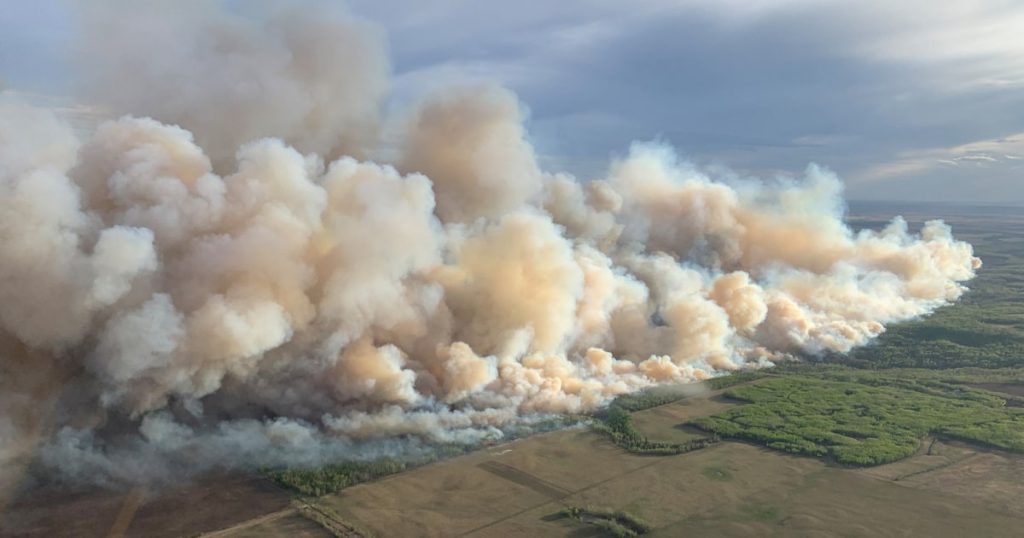The first major wildfires of the season have spread to roughly 19,000 acres across Western Canada, prompting evacuation orders in British Columbia and poor air quality warnings across provinces. Thousands of residents in Northern Rockies Regional Municipality and Fort Nelson First Nations were evacuated as the nearby blaze spread. Mayor Rob Fraser stated that most of the 3,500 residents in and around Fort Nelson had been evacuated, and an evacuation order was issued for Fontas, an Indigenous community located 4.35 miles from the town. In Alberta, residents of Fort McMurray, an oil hub that faced extensive damage from wildfires in 2016, were asked to prepare to leave, as two wildfires were extreme and out of control, including one located 16 km southwest of the town that grew significantly over the weekend.
Authorities in Alberta stated that the fire near Fort McMurray had subdued but was expected to increase as temperatures soar, with winds from the southeast pushing the wildfire away from a major highway and toward the Athabasca River. The fire was reportedly started by a tree blown down by strong winds falling onto a power line. Six crews of wildland firefighters, 13 helicopters, and airtankers were working to tame the fire, with evacuation alerts in place for Fort McMurray, Saprae Creek Estates, and expanded to Gregoire Lake Estates and Rickards Landing Industrial Park. While there is no immediate risk to these communities, the alerts ensure residents are prepared to evacuate if conditions change. Smoke in Fort McMurray on Saturday was from fires in northern British Columbia, leading Environment Canada to issue a special air quality statement extending from British Columbia to Ontario on Sunday.
The federal government of Canada has warned of another potentially “catastrophic” wildfire season, as it forecasts higher-than-normal spring and summer temperatures across much of the country, boosted by El Nino weather conditions. The country experienced one of its warmest winters with low to non-existent snow in many areas, raising fears of a hot summer triggering blazes in forests and wildlands amid an ongoing drought. The forecast of high temperatures and dry conditions has heightened concerns about the potential for more wildfires, particularly in areas already affected by the blazes. The government and authorities are taking measures to prepare for and respond to the wildfires, with firefighting crews, helicopters, and airtankers deployed to manage the fires and assist in evacuation efforts.
The wildfires in Western Canada have had significant impacts on the communities in their path, with thousands of residents evacuated and facing the potential loss of their homes and livelihoods. The evacuation orders issued in British Columbia and Alberta highlight the urgent need to ensure the safety of residents and protect them from the growing threat of the wildfires. The spread of smoke and poor air quality warnings across provinces further emphasize the broader impact of the wildfires on the environment and public health. As firefighters work to contain the blazes and mitigate the risks posed by the wildfires, the government and emergency response agencies are closely monitoring the situation and coordinating efforts to address the ongoing challenges presented by the fires.
The wildfires near Fort McMurray, a town that faced devastating wildfires in 2016, serve as a stark reminder of the potential for recurring natural disasters and the need for resilient and adaptive response strategies. The extreme and out-of-control nature of the wildfires in Alberta, coupled with the forecast of worsening conditions due to high temperatures and dry weather, highlight the urgent need for effective wildfire prevention and management measures. The proactive measures taken by authorities, such as issuing evacuation alerts and deploying firefighting resources, demonstrate a commitment to safeguarding communities and mitigating the impacts of the wildfires. However, the unpredictable and rapidly evolving nature of wildfires underscores the challenges faced in responding to and controlling these natural disasters, underscoring the importance of ongoing preparedness and vigilance in addressing the risks posed by wildfires in Western Canada.
The special air quality statement issued by Environment Canada underscores the health risks posed by the wildfires and the importance of protecting vulnerable populations, especially those with respiratory conditions, from exposure to smoke and poor air quality. The widespread impact of the wildfires, as evidenced by the extended air quality warnings from British Columbia to Ontario, highlights the need for coordinated efforts to address the environmental and public health challenges posed by the blazes. The federal government’s warning of a potentially “catastrophic” wildfire season underscores the gravity of the situation and the need for heightened vigilance and preparedness in the face of increasing risks of wildfires. As the wildfires continue to spread and pose risks to communities across Western Canada, ongoing monitoring, communication, and response efforts are crucial in protecting lives, property, and natural resources from the destructive impacts of the blazes.


